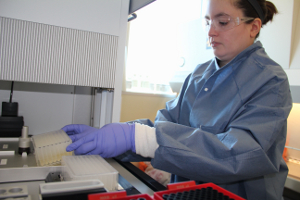General Microbiology
Parasitology
The Parasitology section of the laboratory performs fecal concentrations and other stains for detection ova and parasites. In addition, blood smears are examined for the presence of malaria and other blood and tissue parasites. Identification of worms from clinical specimens is also performed. Laboratories can submit arthropods to the Parasitology section for identification when associated with disease.
Rabies
When there is a human exposure to animal that is suspected of being rabid, the brain and brain stem of the animal can be submitted for testing. Testing is performed seven days per week. All positive results are immediately phoned to the physician or veterinarian so that post exposure treatment can be administered. SHL will not be able to return any materials or containers that arrive with samples that are to undergo rabies testing due to public health concerns. (See collection instructions requirements)
Virology
The State Hygienic Laboratory provides the full range of services for the diagnosis of viral infections. We perform viral culture to detect the virus from clinical specimens, and, for identification of viruses, fluorescent antibody staining. Common viruses detected include respiratory virus and herpes viruses.
Bacteriology
Bacteriology uses the latest methods to isolate, identify and characterize pathogens. Some of the services offered in the Bacteriology section are:
- Pulsed Field Gel Electrophoresis of gastrointestinal bacterial pathogens (Salmonella, Shigella, STEC, Listeria) and other pathogens upon request
- Culture of stools for fecal pathogens and confirmation of STEC broth
- Culture of clinical specimens for uncommon pathogens (Corynebacterium diphtheria)
- Identification of difficult to identify isolates by 16S Ribosomal rDNA sequencing
- Confirmation of vancomycin resistant or intermediate Staphylococcus aureau (VRSA/VISA)
- Culture of clinical specimens for Legionella
- Confirmation of suspect agents of bioterrorism
Mycobacteriology
The State Hygienic Laboratory provides the full range of services for the diagnosis of latent TB (see serology for Interferon Gamma Release Assay) and active TB. To diagnose active TB, we offer fluorescent smear and culture of clinical specimens and PCR of smear positive specimens. For identification of acid fast bacilli, the Hygienic Lab performs DNA probes, 16S Ribosomal rDNA sequencing, and biochemicals. We perform susceptibility testing of all Mycobacterium tuberculosis isolates.
Mycology
The State Hygienic Laboratory provides the full range of services for the diagnosis of fungal infections from clinical specimens and referred isolates. Culture, biochemical testing, growth on differential media, macroscopic and microscopic examination of colonies, and 16S Ribosomal rDNA sequencing are all employed to reach conclusive identification of yeasts and molds.



